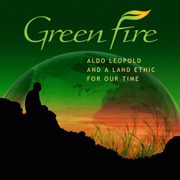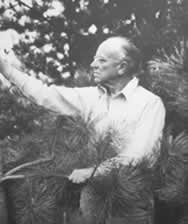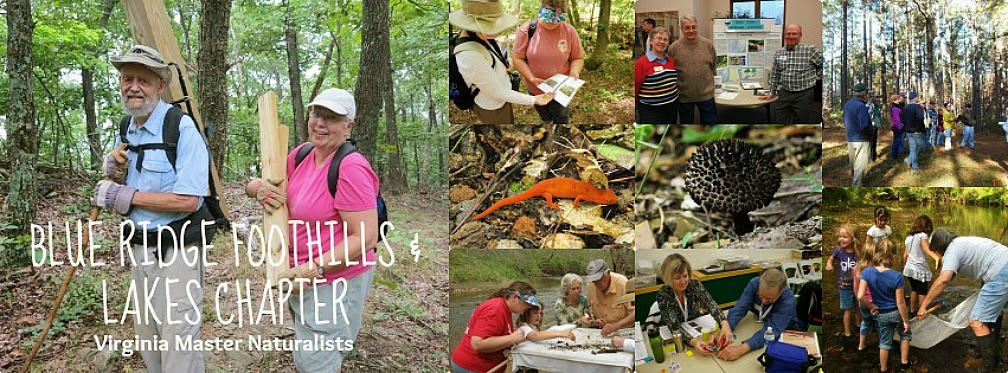SHARING THIS FROM VIRGINIA STATE PARKS Blog:
New Documentary on Aldo Leopold to be Shown
New Documentary on Leopold Showing at Southwest Virginia Higher Education Center and Emory & Henry College
Green Fire film connects legendary conservationist Aldo Leopold with modern environmental projects
On January 26, and February 2, 2012, the Holston Rivers Chapter of the Virginia Master Naturalists will host a free screening of a new film called Green Fire, the first full-length, high definition documentary film ever made about legendary conservationist Aldo Leopold. The film explores Aldo Leopold’s life in the early part of the twentieth century and the many ways his land ethic idea continues to be applied all over the world today.

Green Fire: Aldo Leopold and a Land Ethic for Our Time is a production of the Aldo Leopold Foundation, the US Forest Service, and the Center for Humans and Nature. The film shares highlights from Leopold’s life and extraordinary career, explaining how he shaped conservation in the twentieth century and still inspires people today. Although probably best known as the author of the conservation classic A Sand County Almanac, Leopold is also renowned for his work as an educator, philosopher, forester, ecologist, and wilderness advocate.
The film is being shown in community screening venues like this one throughout 2011. It will then be released on public television in early 2012.
“Aldo Leopold’s legacy lives on today in the work of people and organizations across the nation and around the world,” said Aldo Leopold Foundation Executive Director Buddy Huffaker. “What is exciting about Green Fire is that it is more than just a documentary about Aldo Leopold; it also explores the influence his ideas have had in shaping the conservation movement as we know it today by highlighting some really inspiring people and organizations doing great work to connect people and the natural world in ways that even Leopold might not have imagined.”

Aldo Leopold
Green Fire illustrates Leopold’s continuing influence by exploring current projects thatconnect people and land at the local level. Viewers will meet urban children in Chicago learning about local foods and ecological restoration. They’ll learn about ranchers in Arizona and New Mexico who maintain healthy landscapes by working on their own properties and with theirneighbors, in cooperative community conservation efforts. They’ll meet wildlife biologists who are bringing back threatened and endangered species, from cranes to Mexican wolves, to the landscapes where they once thrived. The Green Fire film portrays how Leopold’s vision of a community that cares about both people and land—his call for a land ethic—ties all of these modern conservation stories together and offers inspiration and insight for the future.
“The making of Green Fire has been a process of discovery,” says Curt Meine, the film’s on-screen guide. Meine’s doctoral dissertation was a biography of Aldo Leopold, published as Aldo Leopold: His Life and Work (University of Wisconsin Press, 1988). To give the film its modern perspective of Leopold’s influence in the conservation movement today, Meine was charged with conducting hundreds of interviews with people practicing conservation all over the country. “Meeting all those people has really yielded new connections between Leopold and nearly every facet of the environmental movement, including ocean conservation, urban gardening, and climate change—issues that Leopold never directly considered in his lifetime but has nonetheless affected as his ideas are carried on by others,” said Meine.
The Aldo Leopold Foundation is distributing the film to community screeners, and is a 501(c)3 not-for-profit organization based in Baraboo, Wisconsin. The foundation’s mission is to inspire an ethical relationship between people and land through the legacy of Aldo Leopold. Leopold regarded a land ethic as a product of social evolution. “Nothing so important as an ethic is ever ‘written,’” he explained. “It evolves ‘in the minds of a thinking community.’” Learn more about the Aldo Leopold Foundation and the Green Fire movie at www.aldoleopold.org.
The film is being shown twice:
7:30 pm on January 26, 2012: Executive Auditorium of the Southwest Virginia Higher Education Center in Abingdon, Virginia
7:30 pm on February 2, 2012: Wiley Auditorium on the Emory & Henry College Campus, Emory, VA (NOTE from Shellie - if any BRFAL CHAPTER decide to attend, might I suggest renting a cabin at HUNGRY MOTHER STATE PARK which is not too far from Emory & Henry) a 2 bedroom cabin which sleeps 6 is just $80 per night. CLICK HERE TO BOOK ONLINE - THERE ARE A FEW AVAILABLE AS OF 01/10/12
For more information, Steve Lindeman, (276) 676-2209, slindeman@tnc.org
# # # # # # # # # # # # #
ABOUT THE PARTNERS
The Virginia Master Naturalist Program is a statewide corps of volunteers providing education, outreach, and service dedicated to the beneficial management of natural resources and natural areas within their communities.
The Aldo Leopold Foundation is a 501(c)3 not-for-profit organization based in Baraboo, Wisconsin. The foundation’s mission is to inspire an ethical relationship between people and land through the legacy of Aldo Leopold. Leopold regarded a land ethic as a product of social evolution. “Nothing so important as an ethic is ever ‘written,’” he explained. “It evolves ‘in the minds of a thinking community.’” Learn more about the Aldo Leopold Foundation and the Green Fire movie atwww.aldoleopold.org.
The Center for Humans and Nature explores and promotes human responsibilities in relation to the whole community of life. Connect with the center’s ideas through the free e-journal Minding Nature, and find out more about their work by visiting the Programs & Projects webpage atwww.humansandnature.org.
Established in 1905, the U.S. Forest Service is an agency of the U.S. Department of Agriculture that manages 193 million acres, conducts forest research, assists forest landowners and helps formulate international forest policy. Learn more about the Forest Service at www.fs.fed.us.

No comments:
Post a Comment
Thanks for your comment and interest! NOW GO OUTSIDE!